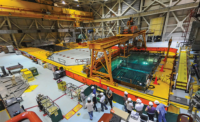
A large research and development effort is under way in New Zealand, aimed at harnessing a natural geothermal energy source of more than 10,000 MW that sits beneath the country’s Taupo Volcanic Zone.
The program’s overall objectives include analyzing how the fluid and rock interact below four kilometers; discovering what factors cause permeability; examining what issues might affect well productivity; and estimating the potential for sustainable, deep geothermal resource utilization in the zone.
So far, the country has exploited geothermal resources down to about 3 km at temperatures up to 330° C. The Taupo Volcanic Zone (TVZ) contains deep geothermal sources, down to 5-km depths, where temperatures are likely to exceed 400° C.
The first stage of research is focused on what type of resource is available. That research is being led by Greg Bignall of GNS Science, a geosciences firm based near Wellington in Lower Hutt.
The goal of the TVZ program is to drill, sample and assess the permeability, structure and energy potential of deep-seated geothermal activity in the zone, Bignall says. “Understanding the permeability structure of the deep-seated TVZ geothermal system is crucial to [the resources'] future sustainable utilization,” he says.
Bignall says the TVZ resources are unusual because they are both deep and high temperature. He said geothermal resource temperatures in Europe are lower than in the TVZ—for example, drilling projects in Germany and Russia reached greater depths but tapped much lower resource temperatures. The TVZ is expected to possess supercritical or nearly supercritical fluids at depths of 4 km to 5 km. (Substances become "supercritical" when subjected to temperature and pressure above the critical point at which the liquid and gas phases are indistinct.)
The first research stage, called “Hotter and Deeper,” is expected to conclude in 2012. GNS is working with Victoria University, Wellington, the University of Auckland and Industrial Research Ltd., a Crown Research Institute of New Zealand.
Future research will focus on the geoscience and engineering associated with the proposed “deep hole” in the Taupo Volcanic Zone.
The government and eventually industry will fund the program. Bignall said the team estimates the cost of drilling at up to NZ$30 million.


